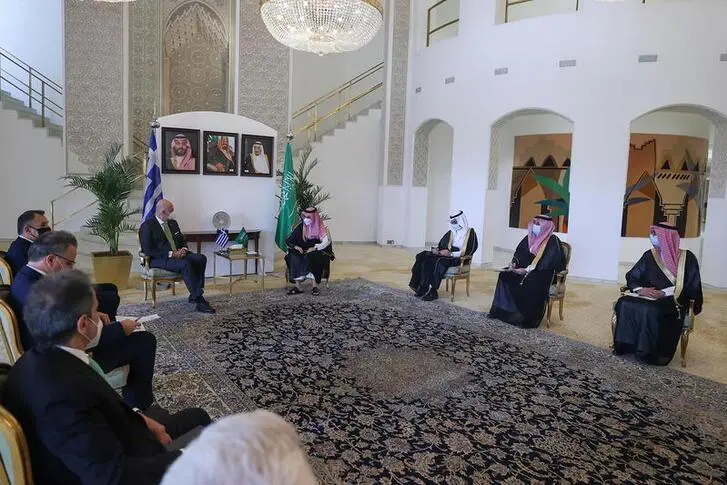PHOTO
The Gulf Cooperation Council (GCC) and Greece signed a memorandum of understanding this week, establishing a new format for political, economic and cultural engagement. Although ad hoc cooperation and discussions about a GCC-Greece cooperation framework had been ongoing for some time, this is the first formal accord with such a wide scope. The signing of the agreement in Riyadh on Tuesday followed a meeting between the GCC secretary-general and the Greek ministers of foreign affairs and defense at the GCC headquarters, where the new deal was discussed, as well as the modalities to implement it.
The new agreement builds on a long history of multifaceted engagement between Greece and the Gulf region that goes back millennia. Ancient Greek texts discussed the affairs of Arabia at length and expressed fascination with the mysterious peninsula. Trade and cultural exchanges flourished. Fascination with Ancient Greek philosophy and science was equally important in shaping the cultural history of the Gulf region and beyond.
The special Arab-Greek relationship has endured over the centuries, ebbing and flowing with political and economic developments. Politically, Greece has had an even-handed approach to the Israel-Palestine conflict and consistently supported Palestinian aspirations for independence, even when that position was not popular with some of its allies. On the business side of things, Greek businesses were among the first players in the boom years of the 1970s in the GCC region, and they have continued to play an important role.
During the global financial crisis of 2008-09, Greece and the GCC sought to increase their cooperation to help face the economic challenges of that period. In February 2017, in a meeting in Riyadh attended by then-President Prokopis Pavlopoulos, it was agreed to work toward formalizing cooperation between Greece and the GCC.
This year, Greece celebrates 200 years of independence and, with it, a new determination to rejuvenate traditional ties with the region. Over the past few weeks and months, it has engaged with GCC countries on political, defense and economic cooperation, and that engagement is growing.
After signing the agreement this week, the next step is to agree on a joint action plan to flesh out the outlines of cooperation. The current draft, expected to be finalized soon, covers political dialogue, trade and investment, education and training, culture and tourism, and the environment.
The proposed GCC-Greece political dialogue and consultations aim to strengthen strategic cooperation on regional security, peace and stability. This cooperation is based on mutual respect for the UN Charter and international law, which should govern relations between countries of the region. Both agree on the need to preserve and strengthen the rules-based system, whether in politics, security or trade.
On trade and investment, the two sides realize that they are starting from a relatively low point when their potential and geographical proximity are taken into consideration. Last year, because of coronavirus disease restrictions, GCC-Greece two-way trade declined to less than $2 billion — a trifle compared to the combined size of their markets, which is about $2 trillion. Looking beyond the pandemic-induced recession, they plan to boost trade and investment by strengthening links between their business communities and financial institutions, as well as by removing trade and investment impediments.
On education and professional and technical training, they plan to encourage student, faculty and scholarly exchanges and encourage their institutions to share best practices.
There is especially great potential in terms of cultural exchange and tourism. Greece has long had a sharp focus on promoting its cultural riches, with tourism representing a significant part of its economy. GCC countries are now paying more attention than ever to cultural exchanges and have ambitious designs to grow the tourism sector as part of their diversification plans. This sector is among the most promising low-hanging fruits of their cooperation.
The two sides are among the most enthusiastic advocates in the fight against climate change and for making concrete contributions to the reversal of global warming. They plan to work together to achieve that goal and improve environmental protection, including reversing the degradation of the marine environment.
The renewed GCC-Greece engagement is expected to contribute significantly to preserving peace and security in the region. It will assist each party in diversifying its political and security support systems. It helps restore regional mutual understanding and re-energizes cultural ties. Economically, their cooperation is logical because of their geographical proximity and, hence, lower transport costs, as well the complementarity of their economies. As Saudi Arabia, for example, develops its Red Sea coast and opens it up for tourism, joint tours with Greek and Egyptian destinations would be a natural arrangement.
The renewed cooperation between Greece and the GCC is a natural partnership between two like-minded and complementary parties. It should not be seen as a reaction to regional rivalries or confrontations, but it can still serve to defuse regional conflicts and provide a platform to ease tensions. They believe that differences of opinion should be addressed peacefully in international forums and not allowed to destabilize the region. For example, on the eastern Mediterranean dispute, Greece and the GCC agree that international law, especially the UN Convention on the Law of the Sea, provides the most appropriate globally recognized legal instrument governing maritime disputes and that the International Court of Justice is the best forum to adjudicate border conflicts.
- Dr. Abdel Aziz Aluwaisheg is the GCC Assistant Secretary-General for Political Affairs & Negotiation, and a columnist for Arab News. The views expressed in this piece are personal and do not necessarily represent GCC views. Twitter: @abuhamad1
Copyright: Arab News © 2021 All rights reserved. Provided by SyndiGate Media Inc. (Syndigate.info).





















